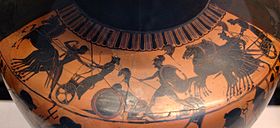Eurypylos (son of Telephus)

Eurypylos ( ancient Greek Εὐρύπυλος ) is king of Mysia in Greek mythology , on the Kaïkos river . He was the son of Heraclid Telephus (hence Telephide) and Priam's sister , Astyoche (according to others, Astyoche was Eurypylos' wife).
In the last phase of the Trojan War , Priam wanted military support from Eurypylos and in this way worked on his mother Astyoche. But Astyoche initially did not want to know anything about it, fearing for her son's life, until a gift from Priam, a golden vine (which Zeus had once given to Laomedon ), persuaded her to send Eurypylos to help the Trojans after all. In doing so, she acted against the promise of Telephus, who had sworn for himself and his descendants not to war against the Greeks. As a brave fighter and ally of his uncle, King Priam, Eurypylos then led strong auxiliary troops of ketiers (Mysians) to the Trojans.
After Nireus (King of Syme ), Eurypylos was considered the second most beautiful hero (in Homer only after Memnon ). In the fight he killed Nireus and the physician Machaon , also Bukolion , Nesos, Chromios , Antiphos , peneleos (King of Thebes ), Eurytos (King of Epeians and Taphians ) Menoikios and Harpalos (weapons companion of Odysseus ). After Eurypylos had struck down several Achaeans in anger over his fallen friend Meilanion (son of Erylaus and Kleite ), he finally fell himself through Neoptolemus , the son of Achilles who had already been killed at that time . He was buried on the bank of the Xanthos in front of the gate of Dardania.
Because Eurypylos had slain Machaon, his name was later not allowed to be mentioned in the temple of Asclepius at Pergamon , as he was not mentioned in the holy hymns in the same sanctuary. The sons of Eurypylos and Neoptolemus, Grynos and Pergamos , settled their fathers' conflict.
literature
- Ludwig von Sybel : Eurypylos . In: Wilhelm Heinrich Roscher (Hrsg.): Detailed lexicon of Greek and Roman mythology . Volume 1,1, Leipzig 1886, Col. 1427-1430 ( digitized version ).
- Karl Tümpel : Eurypylos 3). In: Paulys Realencyclopadie der classischen Antiquity Science (RE). Volume VI, 1, Stuttgart 1907, column 1348 f.
Web links
- Gustav Schwab : Legends of classical antiquity (Chapter 145) Neoptolemus - death of Eurypylos on project Gutenberg-DE
Remarks
- ↑ a b Akusilaos , The Fragments of the Greek Historians (FGrH), No. 2, F 40 = Scholien zu Homer , Odyssey 11, 519ff.
- ↑ a b Scholion zu Juvenal , Saturae 6, 654.
- ↑ See Small Iliad , fragment 6.
- ↑ a b Homer, Odyssey 11, 517-522.
- ↑ Hyginus Mythographus , Fabulae 113; Small Iliad , fragment 6 in Pausanias 3, 26, 9; Quintus of Smyrna , Posthomerica 6, 372ff. and 6, 408ff.
- ↑ Quintus von Smyrna, Posthomerica 6, 615ff.
- ↑ Pausanias 9: 5, 15; Quintus of Smyrna, Posthomerica 7, 98ff. and 7, 122ff.
- ^ Quintus of Smyrna, Posthomerica 8, 109ff .; Euripides Iphigeneia in Aulis 253ff.
- ↑ Quintus von Smyrna, Posthomerica 8, 119ff.
- ↑ Hyginus Mythographus Fabulae 112; Strabon 13, 584; Libraries of Apollodorus , Epitome 5, 12; Quintus of Smyrna, Posthomerica 8, 262ff.
- ↑ Quintus von Smyrna, Posthomerica 9, 41ff.
- ^ Pausanias 3:26 , 10.
- ^ Servius , Commentary on Virgil , Eclogae 6, 72.